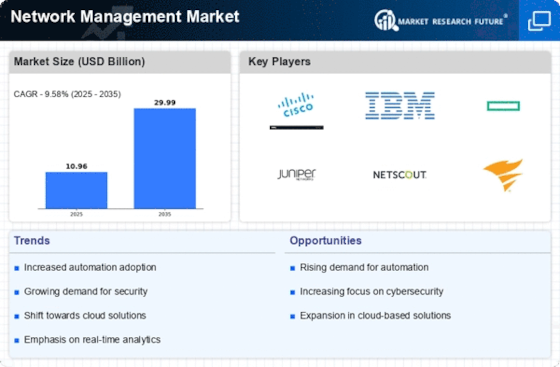Market Analysis
In-depth Analysis of Network Management Market Industry Landscape
network management market is witnessing dynamic changes and significant growth as organizations increasingly rely on complex and interconnected networks to support their operations. Network management refers to the processes, tools, and techniques used to monitor, control, and optimize networks. Several key factors are shaping the market dynamics of the network management market.
Firstly, the rapid expansion of network infrastructure and the proliferation of devices are driving the demand for effective network management solutions. With the advent of technologies such as cloud computing, Internet of Things (IoT), and 5G, networks have become more extensive and diverse. Organizations need robust network management solutions to ensure reliable connectivity, efficient performance, and proactive troubleshooting across their networks.
Secondly, the increasing complexity of networks is fueling the need for advanced network management tools. Traditional network management approaches are no longer sufficient in handling the complexities of modern networks. Organizations require intelligent and automated solutions that can monitor network traffic, identify bottlenecks, and proactively detect and resolve issues to minimize downtime and optimize network performance.
Moreover, the rise in cybersecurity threats is a significant driver in the network management market. With the proliferation of cyber attacks and data breaches, organizations must have comprehensive network management solutions that provide security monitoring, threat detection, and incident response capabilities. Network management tools that integrate security features, such as intrusion detection systems and firewalls, help organizations protect their networks from malicious activities and safeguard sensitive data.
Furthermore, the increasing adoption of virtualization and software-defined networking (SDN) is shaping the market dynamics of network management. Virtualized networks and SDN architectures allow for greater flexibility, scalability, and centralized control. Network management solutions that can seamlessly integrate with virtualized and SDN environments enable organizations to efficiently manage and orchestrate their networks, ensuring optimal performance and resource utilization.
Additionally, the shift towards cloud-based services and hybrid network infrastructures is driving the demand for network management solutions that can provide visibility and control across multiple environments. Organizations require a unified view of their networks, whether they are on-premises, in the cloud, or a combination of both. Network management tools that offer centralized monitoring, configuration management, and performance analytics across these environments are essential in ensuring seamless connectivity and efficient operations.
However, challenges exist in the network management market. The increasing complexity of networks and the rapid pace of technological advancements pose hurdles for organizations in effectively managing their networks. Skills gaps and limited resources can hinder the adoption and implementation of advanced network management solutions. Organizations must invest in training their IT teams and ensure they have the necessary expertise to leverage network management tools effectively.


















Leave a Comment